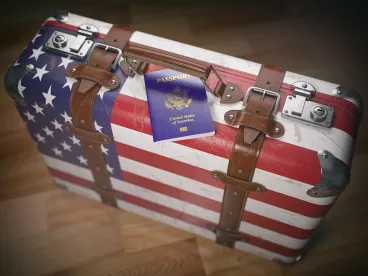On September 24, 2017, President Trump issued a proclamation entitled, “Enhanced Vetting Capabilities and Processes for Detecting Attempted Entry into the United States by Terrorists or Other Public-Safety Threats” (“the Proclamation”). In addition, the White House released a Fact Sheet as well as FAQs on the Proclamation. The Proclamation imposes certain restrictions on the entry of nonimmigrants and immigrants who are nationals of Chad, Iran, Libya, North Korea, Syria, Venezuela, Yemen, and Somalia. The type of travel restriction varies per country, and is reportedly based on Department of Homeland Security (DHS) recommendations pursuant to the executive order 13780, which required a global review of each foreign government’s information sharing practices, policies, and capabilities.
Background
Within days of taking office, on January 27, 2017, President Trump signed an executive order effectively barring admission to the United States (U.S.) for nationals of Iraq, Iran, Libya, Somalia, Sudan, Syria, and Yemen for 90 days, temporarily blocking admission for all refugees for a period of 120 days, and indefinitely suspending admission for refugees from Syria. This initial travel ban was subjected to several legal challenges, including most prominently lawsuits filed by the states of Washington and Minnesota. Facing hurdles in the courts, the Trump Administration announced a revised travel ban, which eliminated Iraq from the list of banned countries and explicitly allowed for individuals in possession of valid visas to enter the country. In addition, the revised travel ban lifted the restriction on Syrian refugees.
The revised ban was also the subject of numerous lawsuits, and ultimately the Supreme Court – while deferring a full hearing on the legality of the ban until October – allowed temporary implementation of the revised travel ban, but excepted those with “any bona fide relationship with a person or entity in the United States” from its purview. After additional actions in the courts, “bona fide relationships” with family members covered by the exception eventually included parents (including in-laws and step-parents), spouse, fiancés, children (including sons and daughters-in-law), siblings, half-siblings, grandparents, grandchildren, brothers-in-law, sisters-in-law, aunts and uncles, nephews and nieces, and cousins. The Supreme Court also indicated that a “bona fide relationship” with an entity meant one that was “formal, documented, and formed in the ordinary course” and provided examples, such as a student admitted to an American university or a worker who accepted an offer of employment from a U.S. company. The revised travel ban was set to expire on September 24, 2017.
The Proclamation, issued the same day that the revised travel ban was set to expire, effectively replaces the ban with a more permanent set of travel restrictions for certain foreign nationals from the same countries minus Sudan and plus Chad, North Korea, and Venezuela. On September 25, 2017, the Supreme Court canceled oral arguments originally scheduled for October 10, 2017 regarding the constitutionality of the revised travel ban and has instead asked parties to present their arguments as to whether the Proclamation has rendered the issue moot.
What countries are subject and how?
The following chart outlines how the travel restrictions are imposed by country (please refer to the effective dates outlined below the chart):
|
Country |
Nonimmigrant Visas |
Immigrant and Diversity Visa |
|
Chad |
No B-1, B-2, and B-1/B-2 visas |
No immigrant or diversity visas |
|
Iran |
No nonimmigrant visas except F, M, and J student visas* |
No immigrant or diversity visas |
|
Libya |
No B-1, B-2, and B-1/B-2 visas |
No immigrant or diversity visas |
|
North Korea |
No nonimmigrant visas |
No immigrant or diversity visas |
|
Syria |
No nonimmigrant visas |
No immigrant or diversity visas |
|
Venezuela |
No B-1, B-2 or B-1/B-2 visas of any kind for officials of the following government agencies: Ministry of Interior, Justice, and Peace; the Administrative Service of Identification, Migration, and Immigration; the Corps of Scientific Investigations, Judicial and Criminal; the Bolivarian Intelligence Service; and the People’s Power Ministry of Foreign Affairs, and their immediate family members. |
No restrictions |
|
Yemen |
No B-1, B-2, and B-1/B-2 visas |
No immigrant or diversity visas |
|
Somalia |
Subject to additional scrutiny |
No immigrant or diversity visas |
*While F, M, and J students are not categorically subject to a travel restriction, they will be subjected to heightened scrutiny when applying for these visas.
Are there any exceptions?
Yes. There are several exceptions, including those who hold visas or other valid travel documents (such as advance parole), diplomats, dual nationals*, U.S. lawful permanent residents (LPRs), and individuals who have been granted asylum or previously admitted to the U.S. as a refugee.
*Dual nationals are exempt so long as they are traveling on the passport of a non-designated country.
Will visas of affected nationals be revoked based on the Proclamation alone?
No. The Proclamation is limited to those without a valid visa on the effective date of the Proclamation.
Is a waiver available?
Yes. As a matter of discretion, a waiver may be granted on a case-by-case basis. To qualify, the foreign national must demonstrate that:
-
Denying entry would cause the foreign national undue hardship;
-
Entry would not pose a threat to the national security or public safety of the U.S.; and
-
Entry would be in the national interest.
Waivers may not be granted categorically, but the Proclamation lists several situations that might be appropriate for a waiver, including:
-
Prior admission to the U.S. for work, study, or other long-term activity but outside of the U.S. on the effective date of the Proclamation and seeking to reenter the U.S. to resume that activity;
-
Significant ties to the U.S.;
-
Business or professional obligations in the U.S.;
-
Family reunification with a close family member who is a U.S. citizen or lawful permanent resident;
-
Infants, young children or adoptees, individuals needing urgent medical care, or other special circumstances;
-
Employment by or on behalf of the U.S. government or an international organization;
-
Canadian permanent residents (must be applying in Canada and should bring proof of their status to the interview);
-
J-1 Exchange visitors; and
-
Travel by request of the U.S. government, law enforcement, or for national security purposes.
When is the Proclamation effective?
The Proclamation will be implemented in two phases:
-
Phase 1: Effective from 3:30PM EDT on Sunday, September 24, 2017 until 12:00AM EDT on Wednesday, October 18.
|
Iran, Libya, Syria, Yemen, and Somalia |
Travel is suspended except for bona fide relationship cases, which includes close family exemptions and formal documented relationships with U.S. entities. “Close family” is defined to include: parent, including parent-in-law, spouse, fiancé, child, adult son or daughter, son-in-law, daughter-in-law, sibling, brother-in-law, sister-in-law, grandparent, grandchild, aunt, uncle, niece, nephew, and first cousin. For all relationship, half or step status is included. |
|
Sudan |
Sudanese nationals are no longer subject to travel restrictions. |
|
Chad, North Korea, and Venezuela (new countries not included in either of the two previous executive orders addressing travel restrictions) |
Implementation will not take effect until October 18. |
-
Phase 2: Effective beginning 12:01AM EDT on Wednesday, October 18, 2017.
|
Chad, Iran, Libya, North Korea, Syria, Venezuela, Yemen, and Somalia |
The bona fide relationship exception will no longer apply. Individuals seeking visas may still qualify for a waiver. |
I am from one of the eight countries, and I have an upcoming visa appointment. What should I do?
The Department of State has indicated that it will not cancel previously scheduled visa appointments and will consider during the visa interview whether the individual is exempt from the Proclamation or is eligible for a waiver. If you require a waiver, you should be prepared to take additional documentation with you to the interview to support your request for a waiver.
What should employers do?
-
Assess travel plans for employees of affected nationalities based on implementation.
-
Consider the ability of those who are dual nationals to travel on a non-restricted country (under the ban) passport.
-
Consider rescheduling meeting locations and using internet-based meeting options.
-
When necessary, compile documentation and information for a potential waiver application, when possible.
-
Be ready for delays.
-
Expect even more substantial delays in issuance of F, M, and J students’ visas for nationals of Iran.
A version of the same chart can be found in the Department of State’s Alert issued on September 24, 2017, which contains information on the Proclamation as well as some FAQs.




 />i
/>i
